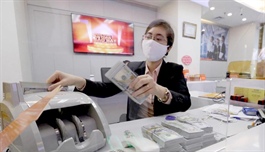Economists cautious on interest rate adjustments
Economists cautious on interest rate adjustments
As Vietnam’s government has raised its inflation target to 4.5 per cent for 2023, policymakers are required to maintain a cautious stance on monetary policy.

Entering 2023, inflation has emerged as the top concern for the Central Bank of Vietnam (SBV). Specifically, inflation was predicted to be above 5 per cent within January. As China’s economy is now fully open, global pricing remains unpredictable, while the US Federal Reserve is still on a path of raising and modifying interest rates.
“Thus, the SBV is under pressure to implement suitable monetary policies,” said banking expert Nguyen Chi Hieu.
BIDV chief economist Can Van Luc also said, “Amid the global economic downturn, some countries may fall into a short-term recession. In this context, Vietnam’s GDP growth is expected to slow in 2023 compared with the high base level of 2022.”
However, the country maintains a good level of GDP growth at 6-6.5 per cent as a base scenario, Luc said. Exports are expected to rise by 8-10 per cent, while domestic and foreign investment is expected to rise by about 8 per cent.
He added that the average consumer price index (CPI) is forecasted to increase to 4-4.5 per cent in 2023 from 3.3 per cent in 2022 due to a lag caused by large imports and a larger seasonal money supply by the end of 2022.
There is also an increase in some items managed by the government this year, including basic salaries, electricity prices, healthcare, and education expenses. Thus, an increase in interest and exchange rates creates mounting pressure for macroeconomic management, including monetary policy.
Unlike other countries, which had to raise interest rates to reduce inflation, Vietnam’s central bank in 2022 didn’t face inflationary pressures on interest rate management but rather exchange-rate pressure, which stemmed from the strengthening of USD globally due to the Fed’s aggressive interest rate hikes and the weakening of other major currencies, according to a Maybank Investment Bank report released in January.
The report predicted that in the first half of 2023, the SBV will likely maintain a cautious stance while monitoring CPI movement. By mid-year, when inflation is expected to be maintained at benign levels, the government will shift to easing policies, including lowering interest rates and giving more credit growth quotas to commercial banks. This will essentially form a moderate cyclical downturn scenario.
“In the event inflation rises above 5 per cent and persists through to July-August 2023, this will likely reduce the room for the central bank to ease monetary policy. As such, interest rates will probably remain at higher levels for longer, resulting in a longer cyclical downturn,” the report said.
Likewise, a report released by VNDIRECT Securities Corporation in November 2022 forecast that the SBV would maintain tight monetary policy during the 2023-2024 fiscal year due to ongoing macro uncertainties, including internal headwinds relating to property and corporate bond markets, a hawkish US Fed putting pressure on the exchange rate and surging interest rates and inflationary pressure.
Yun Liu, an ASEAN economist for HSBC, said, “While yearly headline inflation was relatively low at 3.2 per cent, Vietnam continues to see stronger inflation pressures. December was the third consecutive month of inflation overshooting the SBV’s 4 per cent ceiling. Not only has core inflation accelerated to 5 per cent, but Vietnam has also seen elevated prices for raw materials. This means the SBV will likely continue its tightening cycle.”
As the last central bank in ASEAN to move, the SBV has been playing catch up, hiking rates by 200 basis points (bps) in 2022, Liu added.
“While we expect the SBV to slow its monetary tightening pace as the Fed is expected to slow and FX volatility has eased, its hiking cycle will still be underway. We expect the SBV to raise its refinancing rate by 50bps each in the first half of 2023, taking the refinancing rate to 7 per cent by mid-2023,” Liu said.
According to Pham Chi Quang, director general of the Monetary Policy Department at the SBV, there is a huge risk of recession in 2023, especially for Vietnam’s large trading partners.
“The Fed will continue its battle against inflation by raising its benchmark interest rate until the end of 2024. Amid lingering inflation and high-interest rates, the trend of capital flow shifts continues globally. However, this will not create a strong spillover effect on Vietnam in 2023,” Quang said.
He noted that more challenges await the SBV to handle monetary policy, interest rates, exchange rates, and credit growth in 2023. However, the central bank will likely implement monetary policy with a view to controlling inflation and maintaining macroeconomic stability.


























